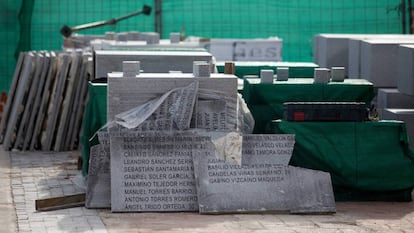Madrid City Hall removes plaques commemorating Franco victims
The local government claims the memorial does not meet the recommendations of a historical memory commission, but critics decry an attempt to whitewash Francoism

Workers on Monday began to remove commemorative plaques bearing the names of Republicans killed by Francoist forces in Madrid between 1939 and 1944. The plaques were part of a memorial that was being built in La Almudena cemetery in the Spanish capital.
Work on the memorial, which was approved under the former local government of leftist mayor Manuela Carmena, began in May, but was brought to a halt in July after the conservative Popular Party (PP) and center-right Ciudadanos (Citizens) took control of Madrid City Hall.
To see the plaques there on the floor is awful. They have killed us again
Tomás Montero, president of the Memory and Freedom Association
The new council – which was formed with the support of far-right party Vox – believes the monument does not meet the conditions of the now-dissolved historical memory commission, which recommended in a non-binding report that “all victims of the Spanish Civil War be honored to prevent new conflicts.”
Madrid City Hall wants to create a memorial to victims of both sides of the conflict – a decision that has upset the descendants of Republican victims.
“They want to erase the same part of history that Francoism tried to erase,” said Tomás Montero, the president of the Memory and Freedom Association. His grandfather was shot in 1939, when his father was just one year old. Montero says that no one from Madrid City Hall has contacted the families affected, and accused the local government of interpreting the findings from the commission’s report for their own purposes.
On Monday, three workers from the construction company Flodi began removing the commemorative plaques, which contain the names of one-third of the 2,936 Republicans victims. “It’s not easy. The slabs are very hard. They have been put down with Pegoland [cement glue] and grain, and it is very hard to remove them,” said one of the workers.
The removed plaques have been placed on pallets. It is still possible to read some of the names: Feliciano García, Maximiliano González...
“We had to accept that this [local] government wanted to erase their names, but to see the plaques there on the floor is awful,” said Montero. “They have killed us again.”
Memorial “practically finished”
When Madrid City Hall suspended work on the memorial on July 12, the project was 80% complete and just three months away from being finished, according to the architect of the project, Julia Chamorro.
“The memorial was practically finished. It is shameful to remove a public asset that has just been built without any justification. This is going to represent unwarranted cost overruns that could have been avoided. But what’s most important is the damage to the families, which is incalculable,” said Rita Maestre, the spokesperson for Más Madrid, which won the most votes at the local election on May 26, but was defeated by the right-wing bloc of the PP, Ciudadanos, and the far-right Vox.
What’s most important is the damage to the families, which is incalculable
Rita Maestre, spokesperson of Más Madrid
“The report says to create two separate memorials [to each side of the Civil War],” added Maestre. “Doing the opposite goes against common sense.”
The commission, which was created in May 2016 and dissolved in June 2018, recommended that a memorial be built to each side of the Civil War. Victims associations disagreed with the decision, arguing in a letter that it would “put those who defended democratic legality on the same level as those who wanted to destroy it.”
Madrid City Hall now wants to remove all names from the commemorative plaques, and allow them to be looked up via QR codes. Ramón Silva, a local councilor for the Socialist Party (PSOE), says the city council is trying to “permanently whitewash Francoism and the Franco dictatorship.”
English version by Melissa Kitson.
Tu suscripción se está usando en otro dispositivo
¿Quieres añadir otro usuario a tu suscripción?
Si continúas leyendo en este dispositivo, no se podrá leer en el otro.
FlechaTu suscripción se está usando en otro dispositivo y solo puedes acceder a EL PAÍS desde un dispositivo a la vez.
Si quieres compartir tu cuenta, cambia tu suscripción a la modalidad Premium, así podrás añadir otro usuario. Cada uno accederá con su propia cuenta de email, lo que os permitirá personalizar vuestra experiencia en EL PAÍS.
¿Tienes una suscripción de empresa? Accede aquí para contratar más cuentas.
En el caso de no saber quién está usando tu cuenta, te recomendamos cambiar tu contraseña aquí.
Si decides continuar compartiendo tu cuenta, este mensaje se mostrará en tu dispositivo y en el de la otra persona que está usando tu cuenta de forma indefinida, afectando a tu experiencia de lectura. Puedes consultar aquí los términos y condiciones de la suscripción digital.








































